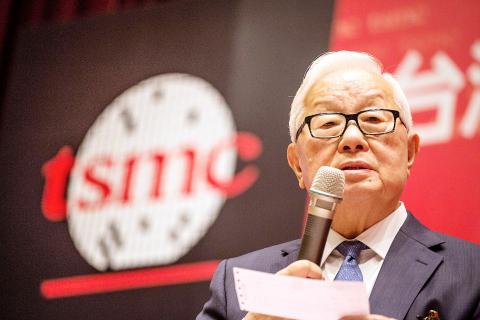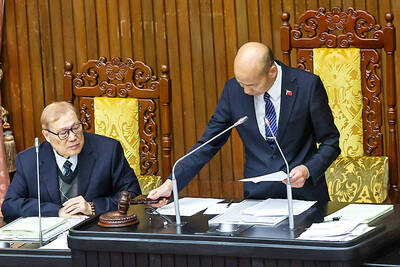China’s plan to cultivate a domestic supply chain for the country’s high-tech manufacturing sector is expected to pose a serious threat to Taiwanese companies, government sources said on Saturday.
Ministry of Economic Affairs sources said Beijing’s efforts to help its own high-tech supply chain flourish to lower dependence on imported parts have already reduced its trade dependence on Taiwan.
The plan unveiled last month by Beijing to create a manufacturing revolution underpinned by smart technologies over the next 10 years could deal a further blow to Taiwan’s exports, they said.

Photo: Bloomberg
The latest plan for China to grow its own high-tech sector, called “Made In China 2025,” takes aim at various sectors, including information technology, and puts a heavy emphasis on semiconductors.
According to figures compiled by the Bureau of Foreign Trade, the ratio of China’s imports from Taiwan to total imports fell to 7.76 percent last year, from 11.3 percent in 2005.
South Korea has faced a similar trend, though the decline has been less precipitous. South Korea’s share of China’s imports fell from 11.64 percent in 2005 to 9.69 percent last year, according to the figures.
In 2000, semi-finished products made up almost 60 percent of China’s total imports, but the ratio fell to about 20 percent between 2012 and last year, the bureau’s statistics showed, indicating that China’s efforts to upgrade its industrial supply have paid off.
Ministry sources said that the so-called “red supply chain,” referring to the fast-growing cluster of high-tech components cultivated by the Chinese government, could send more ripples through Taiwan’s high-tech sector.
The “Made In China 2025” plan has set its sights on mastering critical technologies in the integrated circuit sector, ranging from IC design, wafer foundry operations, and IC packaging and testing services — all areas in which Taiwanese manufacturers excel.
It would build on major strides already made by China in upgrading its semiconductor sector. In 2009, China-based HiSilicon Technologies Co (海思半導體) was the only Chinese IC designer to rank in the top 50 in the world, but there were nine Chinese companies in the top 50 last year.
While Taiwan Semiconductor Manufacturing Co (台積電) chairman Morris Chang (張忠謀) still has faith in Taiwan’s semiconductor sector, saying the gap between Taiwan and China is widening instead of narrowing, Nanya Technology Corp (南亞科技) president Charles Kau (高啟全) said that China’s high-tech development initiatives “will seriously affect Taiwan’s IC industry.”
Paul Wang (王伯元), chairman of Internet communications device supplier Sercomm Corp (中磊), said the government should follow in China’s footsteps and set up a NT$100 billion (US$3.22 billion) fund to support the local semiconductor industry.
China’s initiative may prove damaging to Taiwan’s semiconductor sector by more than simply supplanting imports from Taiwan with home-grown products.
Analysts said many IC firms in China are gearing up to woo high-tech talent from Taiwan by offering people attractive compensation packages, while picking up technology by purchasing patents.
These moves could eventually erode Taiwan’s competitive edge in the global semiconductor industry, analysts said.

DEFENDING DEMOCRACY: Taiwan shares the same values as those that fought in WWII, and nations must unite to halt the expansion of a new authoritarian bloc, Lai said The government yesterday held a commemoration ceremony for Victory in Europe (V-E) Day, joining the rest of the world for the first time to mark the anniversary of the end of World War II in Europe. Taiwan honoring V-E Day signifies “our growing connections with the international community,” President William Lai (賴清德) said at a reception in Taipei on the 80th anniversary of V-E Day. One of the major lessons of World War II is that “authoritarianism and aggression lead only to slaughter, tragedy and greater inequality,” Lai said. Even more importantly, the war also taught people that “those who cherish peace cannot

STEADFAST FRIEND: The bills encourage increased Taiwan-US engagement and address China’s distortion of UN Resolution 2758 to isolate Taiwan internationally The Presidential Office yesterday thanked the US House of Representatives for unanimously passing two Taiwan-related bills highlighting its solid support for Taiwan’s democracy and global participation, and for deepening bilateral relations. One of the bills, the Taiwan Assurance Implementation Act, requires the US Department of State to periodically review its guidelines for engagement with Taiwan, and report to the US Congress on the guidelines and plans to lift self-imposed limitations on US-Taiwan engagement. The other bill is the Taiwan International Solidarity Act, which clarifies that UN Resolution 2758 does not address the issue of the representation of Taiwan or its people in

The Philippines yesterday criticized a “high-risk” maneuver by a Chinese vessel near the disputed Scarborough Shoal (Huangyan Island, 黃岩島) in a rare incident involving warships from the two navies. The Scarborough Shoal — a triangular chain of reefs and rocks in the contested South China Sea — has been a flash point between the countries since China seized it from the Philippines in 2012. Taiwan also claims the shoal. Monday’s encounter took place approximately 11.8 nautical miles (22km) southeast” of the Scarborough Shoal, the Philippine military said, during ongoing US-Philippine military exercises that Beijing has criticized as destabilizing. “The Chinese frigate BN 554 was

LEISURE: The new law adds Confucius’ birthday, the anniversary of the Battle of Guningtou, Constitution Day and Little New Year as national holidays The Legislative Yuan yesterday passed new legislation adding four national holidays and making Workers’ Day a national holiday for all sectors. The Chinese Nationalist Party (KMT) and the Taiwan People’s Party used their combined majority in the legislature to push the jointly proposed draft through its third and final reading. This new law supersedes the existing regulations for the implementation of memorial days and state holidays, which are administered by the Ministry of the Interior. The new law recognizes Confucius’ birthday on Sept. 28, the anniversary of the Battle of Guningtou on Oct. 25, Constitution Day on Dec. 25 and “Little New Year,”